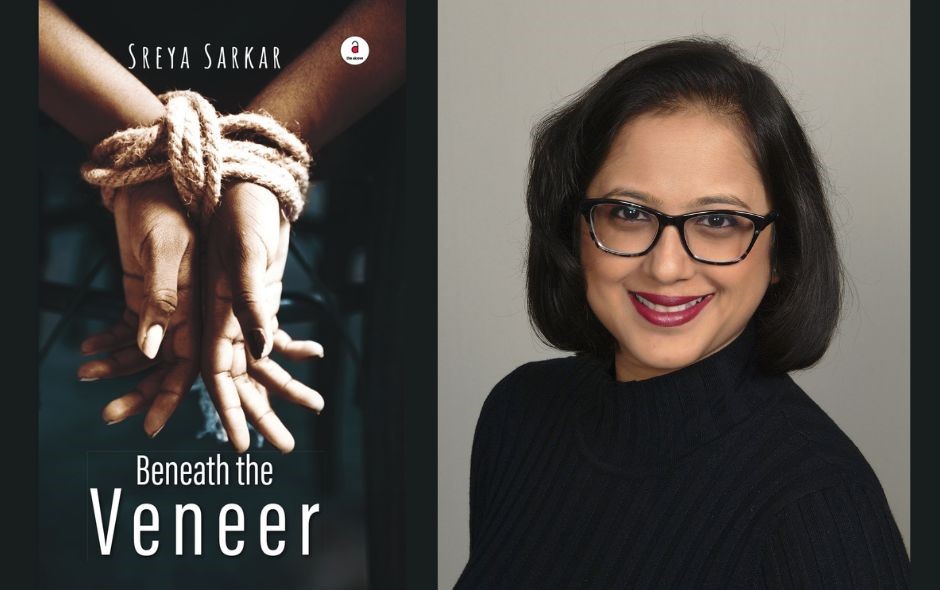BY SURABHI KAUSHIK
In an interview with NRI Pulse, seasoned public policy analyst turned debut novelist SREYA SARKAR shares her journey from writing data-driven pieces to crafting emotionally resonant stories. She discusses the challenges and rewards of writing her first novel, ‘Beneath the Veneer‘, the inspirations behind her characters, and the themes of friendship and resilience that permeate her work.
Synopsis of Beneath the Veneer:
The newly sprouted town of Rangvihar has lured people with the promise of a safe haven, away from Delhi’s maddening din. But beneath its swanky veneer lurks a hidden evil that is devouring the town’s safety.
Six women with troubled pasts – Falguni, Kesri, Gunjan, Asha, Farzeen, and Rani, drawn to the town with the hope of starting their lives afresh, befriend one another to form a safety net. They discover the sinister side of Rangvihar as Falguni’s teenage daughter goes missing. It soon becomes evident that the disappearance is connected to a nefarious human trafficking racket in the town. The plot further thickens with more disappearances and the eventual death of suspects. As the layers of mystery peel off, all six find themselves embroiled in the crisis in unexpected ways.
Pushed to seek a way out of it, what secrets will they unearth about the town as well as each other? Will they be able to re-establish the golden equilibrium of peace and safety they had once come in search of?
How heavy a price do they have to pay to protect themselves?
What inspires you to write fiction?
Having written many fact and data-based pieces to inform and educate my readers as a public policy analyst, I realized that accurate information and analysis might appeal to the reader’s intellect, but what touches and stays with them are stories. Readers might forget the details, but they distinctly remember the emotions they felt surge through them when they read a story. It’s this connection that readers establish with the writer through stories that has inspired me to write fiction.
You have been writing and publishing for many years now. How was the experience of writing your debut novel different from others?
Yes, I have been writing and publishing nonfiction pieces over the years with the occasional short stories and poems for newspapers and literary magazines. Shorter pieces are a quick read and need little space, so when editors see a timely piece, they carry it without much fuss. Writing a full-length novel is a different ball game. You need to convince your literary agent and then a publishing house that readers will appreciate the world you are creating and setting your story in. The problem with catering to what will appeal to readers is that it’s based on the reaction to older or trending books. This may or may not match what you have created, for it is supposed to be fresh and different. It’s therefore important to find an agent and a publisher who understand your vision and are not in a hurry to commission only literary works that mimic books that have worked.
Is the plot of your novel based on real-life experiences or a news story?
My novel amalgamates the stories of six different characters with challenging pasts. Some of them are partly based on newspaper stories, and the rest are based on what I have heard and gathered from friends and family.
I love the female friendships in the novel. To me, the central theme of the novel is also friendships and resilience. How did you come up with this theme?
I have always found and drawn a lot of strength from my interactions and relations with women friends, and that has inspired me to explore this theme. I feel enough does not get written about it. Petty jealousies and catfights find place in popular literature as they have a sensational value, but that’s not real. There is a need to portray the truth about female friendships and bonds.
Who is your favorite character in the book and why?
It’s a tie between Falguni and Rani for me. I find Falguni accessible and kind despite her constant challenges. She is a practical person who understands the value of unity, and that’s why she is also the glue holding the other characters in the book together.
Rani is also a very interesting character. She has the toughness of an athlete, in body and in mind, and a calm determination that makes her decisions and actions uncluttered. Yet, she has the compassion to fathom the pain of others.
Do you have a writing ritual?
I generally write in the early mornings when the house is quiet. I need to immerse myself in the world I am writing about, so I work myself up mentally to be in the headspace of the characters. Being in the zone is important to me, so I listen to music and read books that keep me in my writing zone.
What advice would you give to someone new to writing?
Read as much as you can, not just the genres that appeal to you but also other genres. It’s important to read new writers with fresh voices. If you believe you can write, then most probably you can. So, keep at it. Patience is a true virtue when it comes to creative writing. Write every day if possible, even if it’s scribbling down random thoughts. Try not to emulate how others write because that is not you. You will find your voice and your style eventually. When that comes, let it flow; don’t block it.





